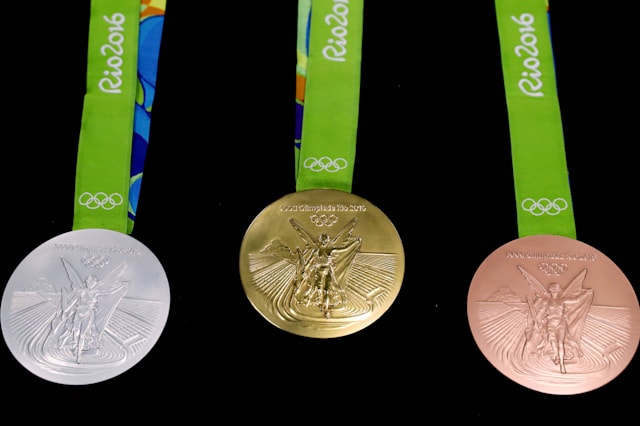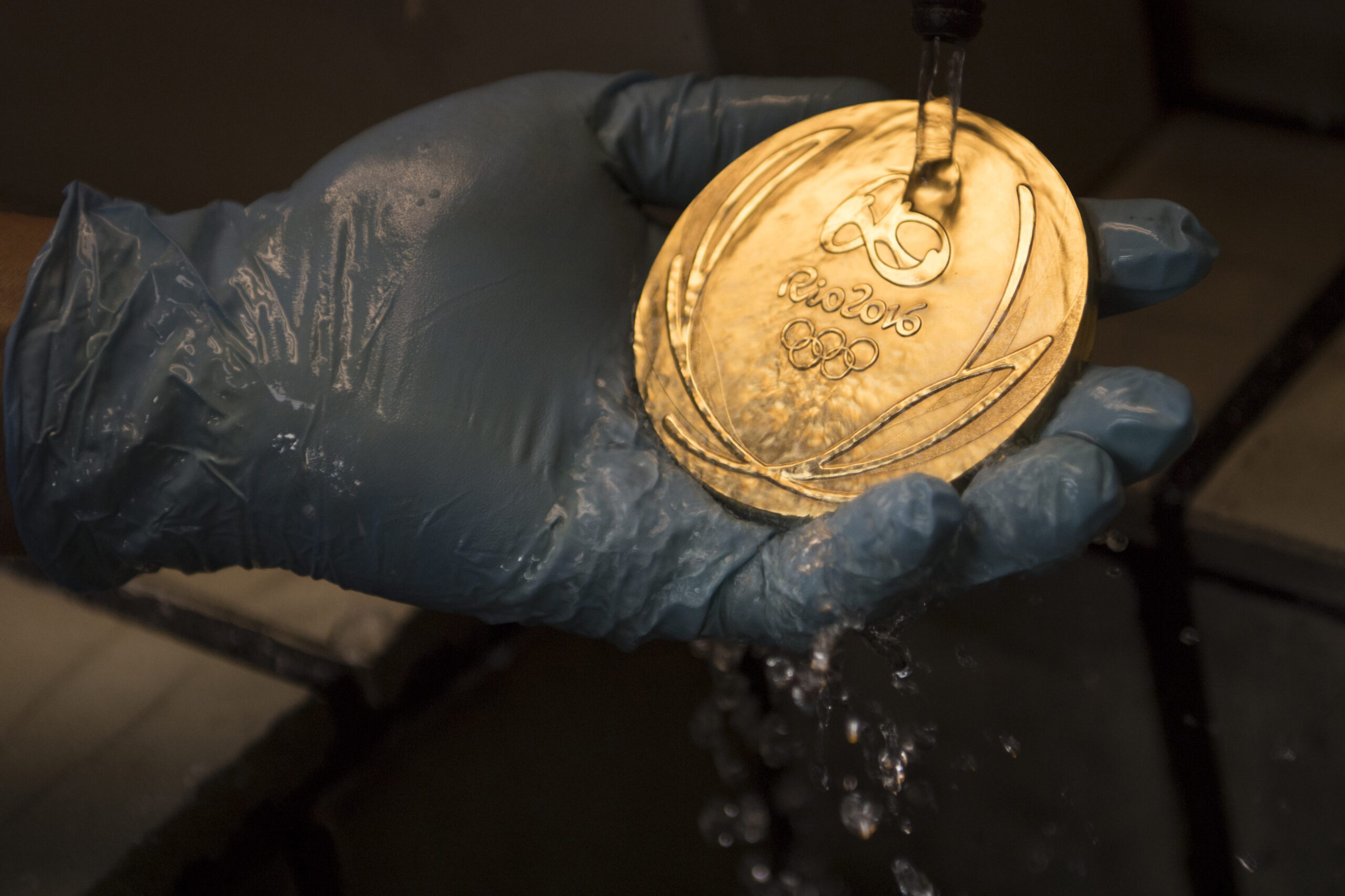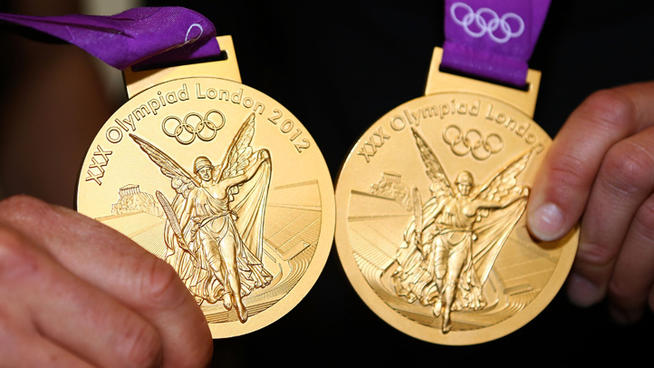Are you curious about the value of an Olympic gold medal? What’s the actual worth of a gold medal from the 2022 Winter Olympics? While it’s definitely a priceless achievement, it’s also worth at least $750 in current metal prices. But do Olympians get paid for their win? Do they have to pay taxes on their earnings? And which country offers the most lucrative rewards for winning a gold medal? In this blog post, we’ll explore these questions and more to give you a better understanding of the financial aspects of Olympic success.

The Value of a Gold Medal: How Much Is It Really Worth?
Olympic gold medals are not only priceless due to their symbolic value but also have a significant monetary worth. At the current metal prices, a gold medal from the 2022 Winter Olympics is worth at least $750. Interestingly, the International Olympic Committee (IOC) has a regulation that mandates gold medals to have a composition of at least 92.5% silver, plated with at least 6 grams of gold. This ensures that the medal has a considerable amount of precious metals, adding to its monetary value. However, the actual value of an Olympic gold medal may vary depending on the market price of gold and silver at the time of the sale. Nonetheless, winning an Olympic gold medal is an achievement that is genuinely priceless and brings unparalleled recognition and honor to the athlete and their country.
>> Must read Who is the top 5 richest athletes of all time?
Exploring the Long-Term Financial Benefits for Olympic Athletes.
While it is true that Olympians do not receive a salary or regular payments just for participating in the Olympic Games, they do stand to earn a significant amount of money if they manage to win a medal. The International Olympic Committee (IOC) awards medal bonuses to athletes who place in the top three in their respective events. These bonuses are paid by the athlete’s National Olympic Committee (NOC) and are meant to recognize the athlete’s achievement and support their continued training and development.
The value of these bonuses varies depending on the athlete’s country and the color of the medal they won. A gold medal is typically worth the most, with a value of $37,500. A silver medal is worth $22,500, and a bronze medal is worth $15,000. While these bonuses can certainly help to offset some of the costs associated with training and competing at the highest level, they are a one-time payment and do not provide ongoing financial support.
It is worth noting that some countries offer additional financial incentives to their medal-winning athletes. For example, Singapore offers a cash prize of $1 million to any athlete who wins a gold medal, while Azerbaijan offers $510,000 for a gold medal, $255,000 for a silver, and $130,000 for a bronze. These incentives can make a significant difference in an athlete’s financial situation, particularly in countries where sports funding is limited.
In conclusion, while Olympians do not get paid for life, their hard work and dedication can certainly pay off in the form of medal bonuses and other financial incentives. However, it is important to remember that these payments are a one-time deal and do not provide ongoing financial support.
Trending now – Why is 24k gold in food?
Are Olympic Athletes Financially Rewarded for Winning?
Olympic athletes dedicate their lives to their sport, but do they make money from their hard work? The answer is not straightforward. Winning a medal at the Olympics can bring fame and recognition, but it does not necessarily translate into financial gain. In fact, for most Olympic athletes, sponsorship is the only source of income. Companies may be willing to sponsor athletes who have the potential to become popular or have a significant following on social media.
Compensation for winning medals varies depending on the country. In the United States, the U.S. Olympic Committee pays cash rewards to medalists. For instance, a gold medalist receives $37,500, a silver medalist gets $22,500, and a bronze medalist receives $15,000. However, this prize money is only a fraction of what an athlete may need to cover their training expenses, travel, and accommodation.
Furthermore, the amount of money an athlete can make from sponsorships depends on various factors, such as their sport, gender, and nationality. Some athletes may be more marketable than others, and therefore, they have more opportunities to secure sponsorships. For example, a female athlete may earn less than a male athlete in the same sport, and an athlete from a developed country may earn more than an athlete from a developing country.
In conclusion, Olympic athletes do not make a consistent amount of money. The amount of money they earn depends on their performance, their popularity, and their marketability. While winning a medal can bring recognition, it does not necessarily translate into financial gain. Therefore, most athletes rely on sponsorships to cover their expenses and support themselves financially.

Taxes and Olympic Athletes: What You Need to Know
Do Olympians pay taxes?
Many people wonder if the United States government taxes Olympic medals, and the answer is yes, they do. The U.S. tax code includes prizes and awards in gross income subject to income tax. This means that the cash bonuses and the value of the medals won by Olympians are taxable. However, the good news is that many winning athletes will not be required to pay income tax.
Fortunately, the U.S. tax code exempts prizes and awards from income tax for those athletes making under $1 million dollars annually. This means that most Olympic athletes, who do not earn a million dollars per year, will not be required to pay taxes on the cash bonuses and medals they receive for winning.
The exemption applies to U.S. athletes as well as foreign athletes competing in the United States. However, some countries like Norway and Sweden have more favorable tax laws for their athletes, exempting all Olympic winnings from taxation.
It is important to note that if an Olympic athlete earns money through endorsements or sponsorships, they will still need to pay taxes on that income. Additionally, if an athlete earns more than $1 million per year, they will be required to pay taxes on their Olympic winnings as well.
Overall, while Olympic medals and cash bonuses are taxable, many winning athletes will not pay income tax. The exemption provided by the U.S. tax code is a significant relief for Olympic athletes who dedicate their lives to training and competing at the highest level.
Countries with the Highest Monetary Rewards for Olympic Gold.

Winning a gold medal is a momentous achievement in an athlete’s career, and for some countries, it comes with a hefty bonus. Countries like France, Germany, and the United States offer significant bonuses to their medal-winning athletes. The United States pays $37,500 for each gold medal won in an individual event, which is the highest bonus among the countries mentioned. France offers a substantial bonus of $73,000 for each gold medal won, but with only 14 gold medals won in the 2022 Winter Olympics, the total bonus paid is lower than that of the United States. Canada offers a bonus of $16,000 for each gold medal, while Germany offers $22,000. These bonuses serve as a reward and recognition for the athletes’ hard work and dedication to their sport. However, it is important to note that not all countries offer bonuses to their medal-winning athletes. Some countries prioritize funding for sports development programs rather than bonuses for individual athletes.
The Employment Status of Olympic Athletes: Are They Able to Work Full-Time Jobs?
Olympic athletes are often considered as full-time professionals, with training and competing taking up most of their time. However, contrary to popular belief, many Olympians hold down “real jobs” to support themselves and their families. For instance, Jamie Nieto, a high jumper, is a professional actor who has appeared in various movies and TV shows. Dennis Bowsher, who competes in pentathlon events, is a specialist in the U.S. Army. Jared Frayer, a wrestler, is a coach and teacher, and Lance Brooks, who throws discus, works in construction.
These Olympians are a testament to the fact that pursuing one’s dreams does not necessarily mean giving up other aspects of life. Many athletes have to balance their passion for sports with other responsibilities, including work and family. They often have to make sacrifices to achieve their goals, but their determination and hard work pay off in the end. These athletes are not just champions in sports but also in life, serving as role models for others who aspire to achieve success in various fields.
It is worth noting that the Olympics have come a long way since the days when only amateur athletes were allowed to compete. Nowadays, even professional athletes can participate, and some earn millions of dollars from endorsements and deals. However, for the majority of Olympians, the road to success is long and arduous, and they have to rely on their own resources to make ends meet. Their stories of perseverance and triumph are what make the Olympics such a compelling event, inspiring people around the world to pursue their dreams and never give up.
The Possibility of Selling an Olympic Medal: Is it Allowed?
Olympic medals represent a lifetime of hard work, dedication, and sacrifice. Winning one is a dream come true for many athletes who have spent years training for that moment. But what happens when an Olympian needs to sell their medal? Is it even legal to do so?
The answer is yes, Olympic medals can be sold. In fact, some former Olympians have resorted to selling their medals to make ends meet. Financial hardships or the need to raise money for charity are common reasons for selling an Olympic medal. However, selling a medal is not as simple as putting it up for auction. The International Olympic Committee (IOC) has strict rules in place to regulate the sale of Olympic medals.
According to the IOC, Olympic medals are the property of the winning athlete. As such, they have the right to sell or give away their medals as they see fit. However, the IOC does have some restrictions in place. For example, Olympic medals cannot be sold while the games are still ongoing. Additionally, the medal cannot be sold if it is still within the eight-year statute of limitations period, which is the time frame in which an Olympic medal can be revoked if an athlete is found guilty of doping.
Despite these restrictions, some former Olympians have successfully sold their medals for large sums of money. For example, swimmer Anthony Ervin sold his gold medal from the 2000 Sydney Olympics for $17,101 in 2017 to raise money for charity. Similarly, Mark Wells, a member of the 1980 “Miracle on Ice” US men’s hockey team, sold his gold medal for $310,700 in 2010 to help pay for his medical bills.
In conclusion, while Olympic medals hold immense sentimental value, they can also be sold if the right price is offered. However, athletes must abide by the strict rules set forth by the IOC to ensure that the integrity of the games is maintained.
Are Olympic athletes compensated for their performances?
Olympic athletes are known for their commitment and dedication to their respective sports. They spend years training and competing to represent their country in the Olympic Games. However, contrary to popular belief, Olympic athletes do not get paid just for attending the games. They don’t receive any salary or wage for participating in the Olympics.
That said, if an athlete wins a medal, there is a financial reward attached to it. The International Olympic Committee (IOC) provides a medal bonus to the winning athletes. The amount of money depends on the type of medal won. A gold medal comes with a bonus of $37,500, a silver medal is worth $22,500, and a bronze medal is worth $15,000. This bonus is given to the athlete by their respective National Olympic Committee (NOC), which is responsible for the country’s participation in the Olympics.
It is worth noting that the bonus amount may vary depending on the country. Some countries provide higher bonuses to their winning athletes. For instance, Singapore offers a bonus of $737,000 for a gold medal, while Kazakhstan offers $250,000 for a gold medal.
It is also important to mention that the medal bonus is subject to taxation. Athletes are required to pay taxes on their earnings from the Olympics. The tax rate may vary depending on the country, but the athletes are expected to declare their earnings and pay taxes accordingly.
In conclusion, Olympic athletes do not get paid just for participating in the games. However, if they win a medal, they receive a bonus from their NOC. The amount of bonus may vary depending on the country, but it is subject to taxation. Winning a medal can be a significant financial reward for the athletes, but it takes years of hard work and dedication to achieve that dream.
Ranking the Value of Olympic Medals: Which One Reigns Supreme?
Olympic medals are not only priceless possessions but also carry a significant monetary value. The current value of an Olympic gold medal is around $26,136. However, the value of a medal is not only determined by the market price of gold, but also by the historical significance and rarity of the medal. For instance, the Turin gold medal, which was awarded during the 2006 Winter Olympics, is one of the most valuable medals in history. It is estimated to be worth around $287,000 in gold for Germany, who won the most gold medals during the games. The United States, who came in second with nine gold medals, is estimated to have a total of $235,000 worth of gold medals.
Interestingly, despite a hole being cut into the medal to represent an Italian piazza, the Turin gold medal is still considered one of the most formidable ever bestowed. Such unique features and historical significance make medals like the Turin gold highly valuable to collectors and enthusiasts.
In conclusion, while the current value of an Olympic gold medal is around $26,136, the historical significance and rarity of certain medals can make them worth much more. The Turin gold medal, for example, is estimated to be worth hundreds of thousands of dollars due to its unique features and importance in Olympic history.
Behind the Scenes: What Happens to Olympic Gold Medals After the Winners Receive Them?
Do athletes keep their gold medals?
The simple answer is yes, Olympians keep their medals. Winning a gold medal is a remarkable accomplishment, and it’s no surprise that some athletes choose to keep their medals to commemorate their success. These medals are a symbol of the athlete’s hard work, dedication, and the pinnacle of their sporting career.
Many Olympians proudly display their medals in their homes, offices, or personal museums. Some athletes even choose to wear their medals out in public, showing off their achievement to everyone they meet. It’s not uncommon for athletes to take their medals on tour, showing them off as part of motivational speeches or fundraising events.
On the other hand, some athletes choose to keep their medals in more private locations, like safes or secret hiding spots. This is often to protect the medal’s value or to prevent theft. Unfortunately, Olympic medals can be valuable to collectors, and there have been instances where medals have been stolen.
Regardless of where they keep their medals, Olympians understand the significance of these awards and the hard work that went into earning them. Winning a medal is not just about the prize, but about the journey and sacrifice that led up to that moment. As such, many athletes will keep their medals for life as a reminder of their dedication and the incredible achievement they accomplished.
While the intrinsic value of an Olympic gold medal is priceless, its actual monetary value is around $750 due to the required silver and gold plating. However, despite their impressive achievements, Olympians do not receive any payments for life, and their earnings from Olympic winnings can vary significantly depending on their country’s policies. Moreover, Olympians must also pay taxes on their earnings like any other working individual. Nevertheless, winning a gold medal can still bring significant financial rewards, with some countries offering large monetary prizes for their athletes’ successes. And while Olympians may not have traditional jobs, their dedication and hard work towards their sport make them true champions. As for selling their medals, it is technically possible, but it is rare as most athletes choose to keep them as a symbol of their accomplishments.



